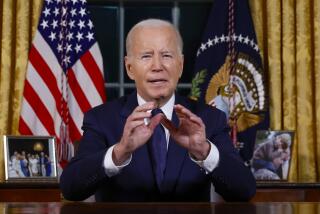NATO and G-8 summits allow Obama to showcase foreign policy
WASHINGTON — Whatever else they achieve, back-to-back summits of world leaders this weekend hosted by President Obama will showcase the perks of incumbency. An American president with sagging approval ratings on the top campaign issue — the anemic economic recovery — will stand in the spotlight as a seasoned world leader.
On Friday, Obama welcomed leaders of the major industrialized nations, the so-called G-8, for an overnight economic gathering at Camp David, the presidential retreat in western Maryland.
On Sunday, he will show off his hometown of Chicago at the two-day NATO security summit, complete with a dinner at Soldier Field, home of the Chicago Bears. Obama will be at the center of an obligatory “family photo” of smiling heads of state in the 28-member military alliance, and he will tout what aides call an on-schedule and responsible winding down of the Afghanistan war by the end of 2014.
There are plenty of sticky issues to be addressed:
The pace of NATO troop withdrawals is still unresolved, and financial pledges are needed to help the Kabul government in the years ahead.
The new French president, Francois Hollande, remains committed to removing French combat troops two years ahead of schedule, a sign of division among the allies.
At the Group of Eight economic summit at Camp David, Obama will advocate more pro-growth policies in an attempt to avert further economic turmoil in Europe, which could rattle the fragile U.S. recovery.
Obama’s homecoming in Chicago will draw the most notice, for better or for worse.
The city has seen four protests this week, and officials are bracing for much larger demonstrations, including an antiwar rally and march on Sunday. If that produces chaos in the streets, rather than a peaceful parade, Obama may get blamed.
But a trouble-free summit could prove to be an election-year boon.
“Voters don’t know much about what these leaders decide to do in their meetings,” says Ian Hurd, a Northwestern University political science professor who studies how nations interact with international institutions. “But if the events end up looking like a success, then that leads to headlines that credit the president, and that then contributes to something in electoral politics.”
With unemployment still high and the Supreme Court considering overturning the new healthcare law, Obama’s signature legislative achievement, his campaign has leaned heavily on his foreign policy accomplishments: ending the Iraq war, killing Osama bin Laden and helping lead the successful NATO mission in Libya.
Polls show that Americans want the troops to come home from Afghanistan, so Obama may also hold a winning political hand with his plan to hand over the lead for combat operations to Afghan forces sometime next year and pull all U.S. and other NATO combat troops out by the end of 2014.
But Obama’s likely Republican challenger, Mitt Romney, has criticized the timeline as poor policy, and at times he has seemed to argue for an extended commitment to keep the Taliban at bay. The Romney campaign also has criticized Obama’s NATO agenda, saying it prioritized politics over policy.
Richard Williamson, a former U.S. diplomat who is a foreign policy advisor to the Romney campaign, said the summit was unlikely to give serious consideration to getting NATO partners to meet financial obligations, to reviewing deficiencies in the Libya mission, or to addressing the violence in Syria.
The administration wants to “put a ribbon around their Afghanistan phaseout,” Williamson said. “But there are a lot of serious issues that face NATO that are not on the agenda.... These are national security issues this president is kicking down the road because he wants a good photo op.”
On Friday, Romney issued a statement saying budget cuts passed by both parties and signed by Obama “will only undermine the alliance.”
“President Obama has sent the message — intentionally or not — that the worth of NATO has diminished in America’s eyes,” Romney said.
Obama may not even get a photo op out of the G-8 meeting. He will mostly be in a listening mode because he has no desire to take on the burden of saving Europe. No major announcement or decision is expected from Camp David.
“We’re not in this game, quite frankly,” said Heather Conley, a senior fellow at the Center for Strategic and International Studies, a Washington think tank. “This is really for Europe to sort out.”
Bob Shrum, a political advisor to several Democratic presidential campaigns, said the power of incumbency is immense when it comes to international crises and foreign policy. And Obama, he argued, has benefited from his record so far.
“Republicans, in my view, have lost what has been a high card in the presidential contest, which is national security,” Shrum said. “That’s an asset for Obama.”
kathleen.hennessey@latimes.com
More to Read
Start your day right
Sign up for Essential California for news, features and recommendations from the L.A. Times and beyond in your inbox six days a week.
You may occasionally receive promotional content from the Los Angeles Times.








